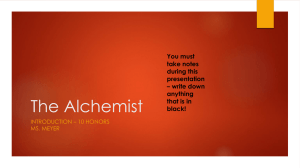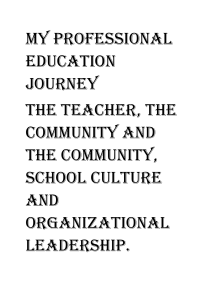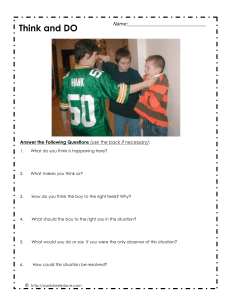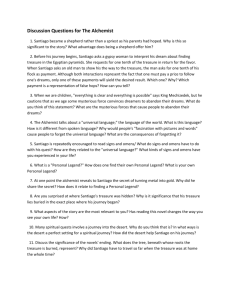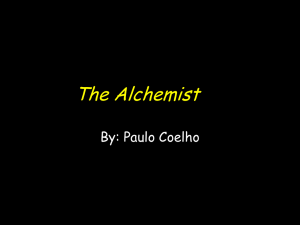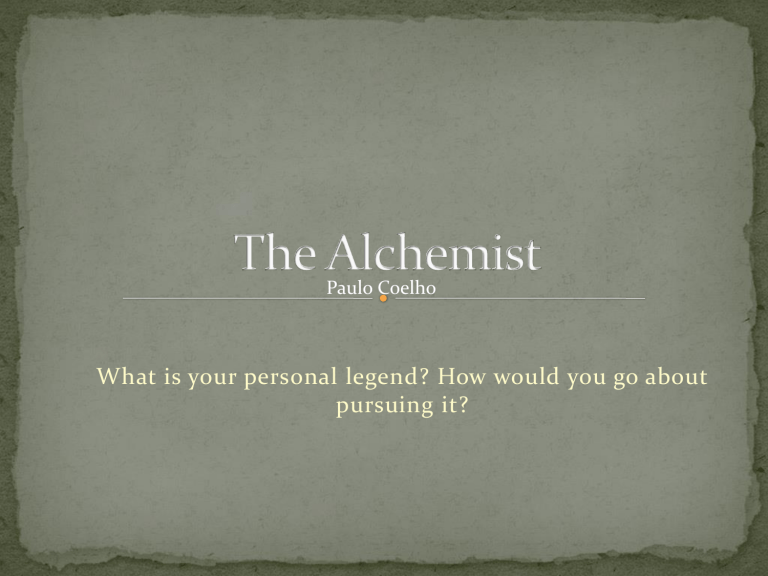
Paulo Coelho What is your personal legend? How would you go about pursuing it? Alchemy: [al-kuh-mee] -noun, plural -mies for 2. A form of chemistry practiced in the Middle Ages and the Renaissance. One goal of alchemy was to find ways to transform cheap, common metals into gold. Another goal was to find an “elixir of life,” which is a magical potion that could make someone live forever. a person who studies or practices alchemy Another important term in this book is the “personal legend.” In the story, the main character, Santiago, searches for his personal legend. Personal legend = destiny. Our job is to pursue our personal legend despite the many distractions placed in our path The Alchemist is a story about Santiago, a shepherd boy It combines philosophies and faiths of many different cultures and time periods. The message of the novel centers upon notions of: Personal truth Fate and destiny Personal happiness The Alchemist is considered by many to be a fable. The characteristics of fables are: Recognizable Characters Simple settings Personification: animals and parts of nature are often given human qualities and characteristics. Teach a moral lesson: a truth about human nature or life Trust your heart Read the seemingly low-key signs Understand that as you look to fulfill a dream, it looks to find you, if you let it Sometimes you can find extraordinary in the ordinary. Introduction by Coehlo. While it is not part of the actual story, it is definitely worth looking into because it describes the author’s thoughts and comments on his success and on the true meaning of the book and application into his life. The Prologue introduces the alchemist and tells a new version of the Greek story of Narcissus. The reader still may not have any idea what the book is going to be about, but the reader definitely knows to be ready for deeper meanings to be explored throughout the book. The book is divided into two parts: Part One describes how the boy comes to realize his Personal Legend, and ends by indicating significant growth in the boy. He has decided to be the main force in controlling his own destiny, and will not let misfortune distract him from his dream. Part Two ends with how he finally reaches the end of his journey, but then realizes where the treasure actually is. *** Each part includes stars (like the example above) to break up the text. The stars indicate a change of pace or change in subject within the novel. The book closes with an Epilogue that tells how the boy recovers the treasure and sums up his journey. This book is set up to feel like a story is being told to the reader. While the boy Santiago is the protagonist (hero), and the story is about him, it is told by an omniscient narrator who is able to give insights into the personal growth of the boy. The narrator makes many statements about life and love, religion and destiny, and therefore gives the impression of the divine. Because the nature of this book is journey-based, the setting changes throughout the boy’s travels. However, in general the setting is the path from southern Spain to the pyramids in Egypt. Al-Fayoum (oasis in Egypt) Tarifa El Cairum (p.76) Salem (Jeru”salem”) Nile Tangier (p. 44) Coptic Monastery Ceuta (p. 44) Moors (p.27) Mecca (p. 54) Sahara Desert (36) “Coming of Age one major theme is the intellectual, moral, and spiritual development of a young protagonist (Santiago). His experiences cross many cultures, but his inner development reflects that of most high school students. Journey—The boy takes a literal journey across many lands in order to find the treasure that he seeks. The book raises the timeless question of whether the journey is more important than the destination. Fate versus Will Fate is constantly intertwined with free will How much of life is under one's control? How much is controlled by fate? The old king in the novel states that the world's greatest lie is that "at some point during our lives, we lose control of what's happening to us, and our lives become controlled by fate." Self-Discovery—Santiago must learn to trust himself and learn how to trust others as he travels to fulfill his Personal Legend. This is not unlike the struggles of those who read the book. Charity—Santiago develops his ability to speak in a universal language, which may be described as charity. He learns how to see people through eyes of love, just as Christ does.

